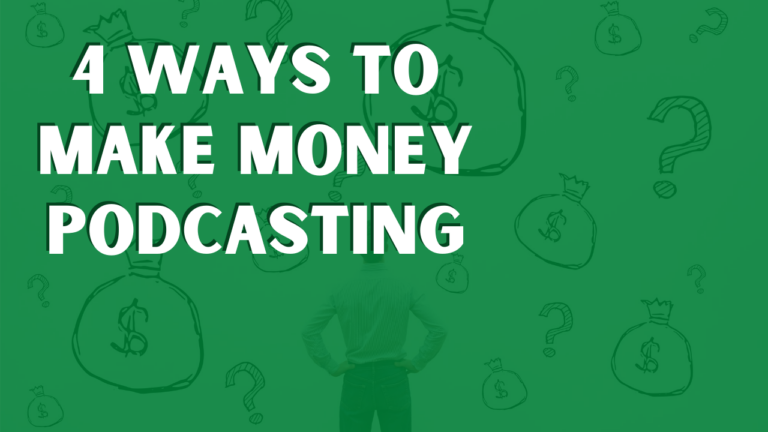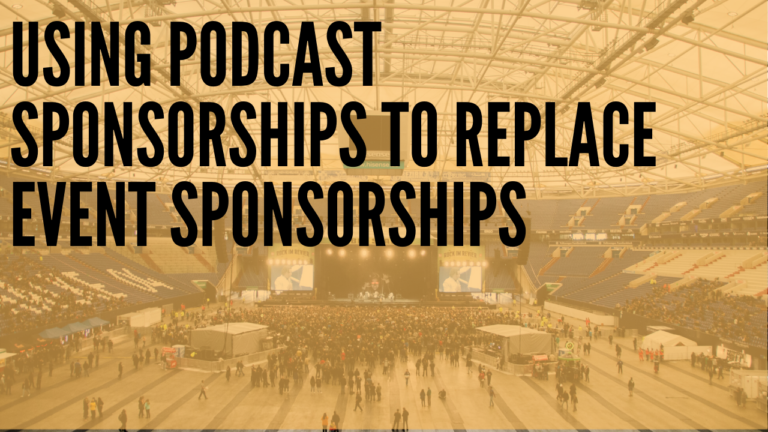3 Ways to Make Money With Your Podcast — and How to Plan Ahead
There are about as many ways to make, market, and monetize a podcast as there are podcasters in the world. Whether you’re new to podcasting, wondering if podcasting is right for you, or even several episodes into your podcasting adventure, one of the best ways to learn about new tricks, tools, and strategies is to talk to other creators.
I recently sat down with podcaster and WordPress developer Nathan Wrigley to chat and answer his questions about podcasting. Both Nathan and I are long-time podcasters with 200+ episodes under our belts. Yet, we’re both still learning: finding new tools and processes that will help our respective shows evolve.
What came out of our rich conversation was a great set of questions for podcasters to consider, especially those who plan to make money from their shows.
Keep reading to learn:
- Why and how you should think about monetization before launching your podcast.
- Why building your email list should be priority number one, and what tools you can use to capture subscribers.
- How to set up a process to reach out to potential sponsors.
Nathan wisely pointed out that in order to get a podcast going and allow it to grow, you’ll have to let it be imperfect. That means being willing to forgive your past self when you look back on your earlier work.
But you can avoid some potential regret by planning ahead.
In Episode 237 of How I Built It, we covered the top questions you should ask yourself as you prepare to launch a podcast.
Should I monetize my podcast from the start?
Before you start a podcast, and before you consider whether it will someday make money, it’s essential to determine WHY you want to start one. No matter where you ultimately land on the question of monetization, your ‘why’ will impact the trajectory of your show.
If you’re starting a podcast as a hobby — a way to share something you love — I would say it’s OK not to consider monetization. On the other hand, if you’re using the podcast to establish your authority and grow your business, then you should at least have an outline of how you want your podcast to make money later on.
There are several ways to monetize a podcast, including:
- Sponsorships: Connect with relevant brands or organizations and mention them on the podcast in exchange for financial support. (More on a process for reaching out to potential sponsors below.)
- Memberships: Charge members a small fee to access exclusive content, such as members-only podcast episodes, articles, case studies or other resources. Learn more about how I created the Build Something Club here.
- Selling your services: Use your podcast to establish your authority and expertise, leading customers to hire you, buy your book, or sign up for your course.
No matter which route you choose, starting with a plan in place will allow you to monetize your podcast when you’re ready to take that step, even if it’s six months or more down the road.
There's more to monetizing than just sponsorship. Establishing authority to sell books or get speaking gigs is a perfect path for podcasting. Click To TweetDo I really need an email list?
My #1 tip for new podcasters: Build your email list from day one!
Even if you don’t use your email list right away, it will be there when you need it. For example, let’s say you don’t want to work with sponsors or are having a hard time getting sponsorships off the ground — but you have a list of 100 email subscribers. These subscribers already listen to your podcast and are into what you’re talking about. If you have a product or service to offer, they’ll be first on your outreach list.
Reaching out to existing fans is a great first step on the path to monetization.
How to choose the right email tool
When you’re first starting an email list, it probably makes sense to use a tool that offers a free plan for small subscriber lists. It’s hard to justify a monthly investment when you’re not yet seeing any measurable return.
My favorite tool that offers a free plan is ConvertKit. The company is heavily focused on working with creators, which I love. But the best feature of ConvertKit is its beautiful landing pages, which can serve as simple podcast websites when you’re getting started.
You NEED to build your list with your podcast. I recommend ConvertKit. It's free to start and easy to use. Click To TweetOne of the biggest mistakes I see new podcasters make is failing to have a clear call to action that sends listeners to a specific place online. A ConvertKit landing page gives listeners a single destination to find episode details, ways to listen, and a place to subscribe to your email list. You can even point a domain to your new page.
Another great tool for WordPress users is a plugin called Newsletter Glue, which uses WordPress’s new block editor interface to simultaneously create your blog post and newsletter. You can even specify which blocks of content go only on your site or only in your email. Newsletter Glue doesn’t offer a ConvertKit integration yet, but I’ve got my fingers crossed.

Learn how podcast pros produce their shows…
…and how you can improve yours.
One breakdown, delivered to your inbox weekly.
Learn the tools and processes used by top podcasters and reclaim hours of your life every week.
How do I create a process for sponsor outreach?
One of the most sensible ways to maintain a list of potential sponsors with their contact information and records of your conversations is to enter the information into a customer relationship management (CRM) platform.
I’ll be the first to admit that I’m terrible at maintaining a CRM, but my process borrows the elements of the software I need to make successful connections.
My (inelegant but functional) process for reaching out to sponsors
I begin with a basic list of companies and contact emails. I’m currently maintaining this in Airtable, although I’m not picky about where I store this list. The list also includes some brief status notes, such as whether I’ve reached out to the contact and whether they’re interested.
When I’m ready to send an inquiry to a batch of potential sponsors, I move their contact information into a Google Sheet that includes fields like:
- First name
- Last name
- Season of the show I’d like them to sponsor
- The reason I want them to be a sponsor
- Next available sponsorship slots
- Ready to send
Using this data, I can send 20+ personalized emails with a few simple clicks. The reason field is the most important because it’s what keeps my email from feeling generic.
If you do want to get sponsors, start with your network and move out from there. Click To TweetWhere to find potential sponsors
Here are a few great places to look for new sponsors:
- Tap your network: When I started the How I Built It podcast, I was focused on the WordPress space where I already had a bunch of contacts. Finding sponsors was easy because I already had the relationships and knew these folks had the budget to spare.
- Tools or products you’re using: If there’s a product you love and you’re in a position to recommend it to your listeners, it’s worth asking the company to partner with you.
- Sponsors of similar podcasts: Listen to podcasts like your own and take note of who sponsors those shows. It’s easier to kick off a conversation when you know the company is already open to podcast sponsorship.
The most important thing about content creation is to make the thing and ship it — put it out into the world so people can begin engaging with it. Podcasts are no exception. But thoughtful planning will serve you well when the time comes to monetize.







